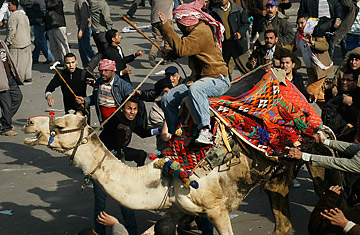
A supporter of embattled Egyptian president Hosni Mubarek rides a camel through the melee during a clash between pro-Mubarek and anti-government protesters in Tahrir Square on February 2, 2011 in Cairo.
The people of Cairo are now waiting to learn the toll from the battle of Tahrir Square on Wednesday. The clashes, which broke out barely an hour after the government allowed Internet connections to resume, have added a new twist to the drama that has gripped the Arab world's largest country: Has the army been on the side of the government after all?
Since military tanks moved in across Egypt on Jan. 28, the army has largely held the support of the anti-government demonstrators and the city's residents. "The whole military is supporting the revolution," said Taher Mohamed, a lawyer, as he headed into Tuesday's so-called march of millions. The sentiment was widespread: the army is neutral; it represents the people; it has refused to fire on demonstrators. Protesters hoping to see President Hosni Mubarak fall paused to shake hands with soldiers or cheer them from the tops of tanks.
But on Wednesday, busloads of Mubarak supporters armed with sticks and machetes as well as a small army of men on horseback were able to get through Cairo's many military and civilian checkpoints, advancing into Tahrir Square seemingly without hindrance from the military. All of this occurred on a day when pedestrians and drivers had to weave their way through practically impenetrable army roadblocks all around downtown Cairo.
As volleys of stones rained down across the pro-Mubarak and anti-Mubarak lines in the square, frantic protesters expressed their shock and horror that the army was not intervening to stop the violence. "The thugs are hitting us from every direction right now," says Mahmoud Afifi, an activist with the 6th of April youth movement, who spoke from the midst of the clashes. "The National Democratic Party paid them money to come in here and attack us. And we don't know why the army didn't stop them. We are very angry at the army now."
Some Egyptians had already raised their eyebrows at the sight of police officers taking up positions alongside soldiers at city checkpoints. The cops, who are unpopular because of their brutal methods, had been withdrawn from their stations after their Jan. 28 assault on the anti-government marchers. But were the cops and the soldiers playing on the same team? On Wednesday, the military called for the protesters to end their demonstrations, a day after Mubarak had delivered a speech in which he pledged not to run for re-election in September.
After that speech, a seemingly growing number of Egyptians said Mubarak's concession was enough and that it was time for life to return to normal. And before the clashes began, Mubarak supporters were greeted by sympathetic honking from cars and motorcycles stuck in traffic as the loyalists passed by. Those supporters, who began to take to the streets on Tuesday, were initially described as being paid by the ruling party. On Wednesday, however, it appeared that they included more than just government pawns among their numbers.
